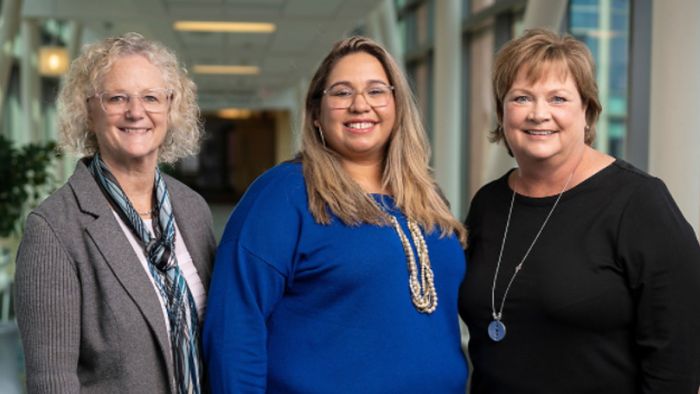The trio of Provider Relations Liaisons started in September 2021 with a focus on sharing the Gillette Children's story with physicians, providers, and many others who generate referrals to our specialty services.
Who they are: Two are new faces – Vicki Kopplin and Reyna Staats. They join Tara Swedberg who transitioned from another role in Planning & Business Development to become a liaison.
- About Vicki: A nonprofit leader with a career focused on epilepsy, including executive roles at the state and national level, Vicki has had Gillette in her sights as a career move for many years. She’s excited to use her background and learn about our specialties in depth, so she can help providers understand when to get their patients to Gillette experts. Vicki earned a Master of Arts degree at Hamline University with a concentration in non-profit management. She has an undergraduate business degree from the University of North Dakota.
- About Reyna: With a deep understanding of sales and business development in the financial marketplace, Reyna is on the path to learning more about pediatrics and the healthcare environment. She enjoys making connections and helping people in their decision-making process. Reyna graduated with a double major in Business Administration and Spanish Communications from the University of Wisconsin River Falls. She is fluent in written and spoken Spanish.
- About Tara: Transitioning from another role at Gillette focused on community engagement, Tara is a natural fit for a liaison role. For many years, she worked in the pharmaceutical and medical device sales field. She is also the mother of a Gillette patient – Logan. Tara graduated with a degree in Biology and Business minor from Gustavus Adolphus College.
The team will continuously meet with Gillette providers to get a clear understanding of the Gillette difference and what they will be communicating to physicians and providers across Minnesota and the region. Knowing that early diagnosis and early interventions are key to better outcomes for complex conditions, the liaisons will help facilitate families getting to the specialty care they need as soon as possible.
Get Partners in Care Stories in your inbox!
Subscribe to Partners in Care Journal, a newsletter for healthcare providers and community health professionals.
Subscribe Today Home Page
Home Page



